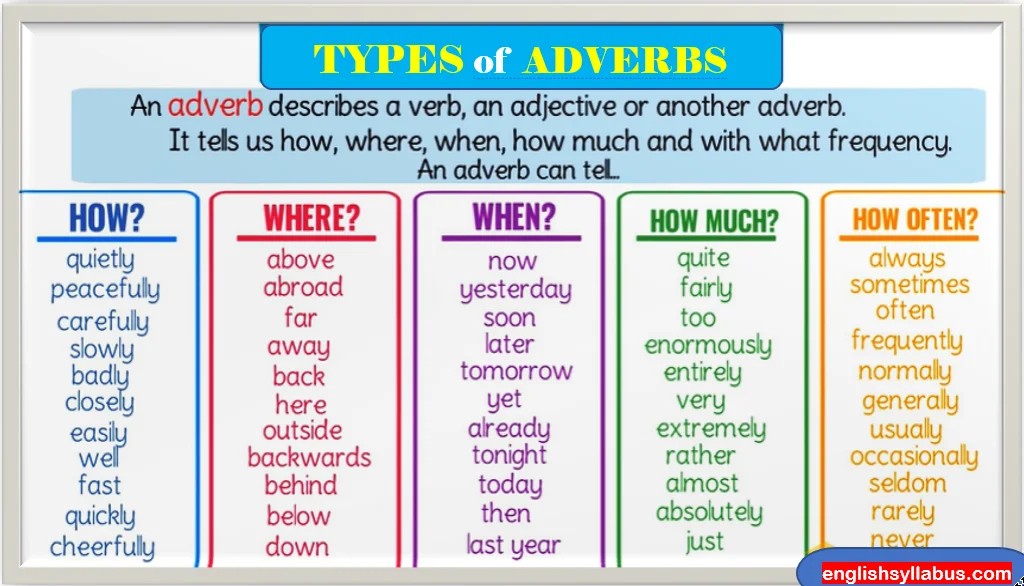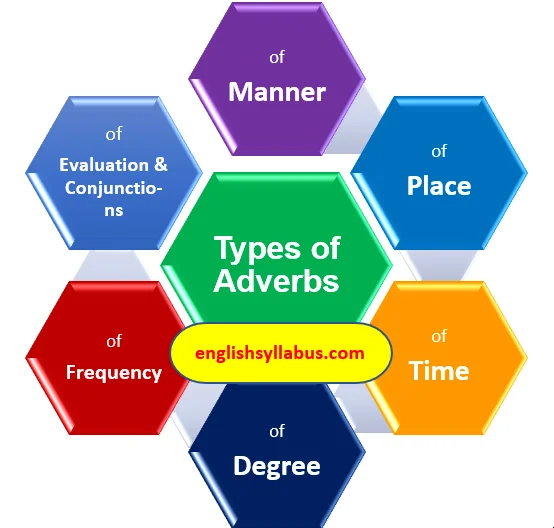Types of Adverbs with Questions
| No. | Types of Adverbs | Questions |
| 1. | Adverbs of Manner | HOW? |
| 2. | Adverbs of Place | WHERE? |
| 3. | Adverbs of Time | WHEN? |
| 4. | Adverbs of Degree | HOW MUCH? |
| 5. | Adverbs of Frequency | HOW OFTEN? |
| 6. | Interrogative Adverbs | QUESTION WORDS |
| 7. | Adverbs of Evaluation | Give OPINIONS or COMMENTS |
| 8. | Conjunctive Adverbs | LINKING ADVERBS |
Introduction to Types of Adverbs
Types of Adverbs tell us (or answer the following questions): how, where, when, how much, how often, and why something happens. So, adverbs are placed at the beginning, middle, and end of the sentence. For example:
- Totally, you spoke the truth.
- You totally spoke the truth.
- You spoke the truth totally.
- Sometimes, I visit the zoo.
- I, sometimes visit the zoo.
- I visit the zoo sometimes.

The 8 Types of Adverbs are the following:
Adverbs of Manner
These types of adverbs tell us way how something happens and is done. Put the question, ‘How’ to find out the adverbs of manner.
- Efficiently
- Cheerfully
- Peacefully
- Honestly
- Painfully
- softly
- Quietly
- Angrily
- Badly
- Closely
- Easily
- Well
- Fast
Examples of Adverbs of Manner
- The team was playing cricket happily.
- The Metropolitan police dealt with the incident very efficiently.
- In the spring, birds sang cheerfully in the trees.
- The fisherman is sitting quietly.
- I’ am climbing upon the tree painfully.
- My students can read clearly. How my students can read. They can read ‘clearly’. You get the answer to the question of how.
- My younger brother plays happily with the toys. How my younger brother plays, he plays ‘happily’.
- The commander speaks bravely. How does the commander speak? He speaks ‘bravely’.
- The policeman acted wisely. How the policeman acted, he acted wisely.
- The old women were walking slowly. How the old women were walking, they walked ‘slowly’.
- The words like clearly, happily, bravely, wisely, and slowly describe the action of adverbs of manner.
Adverbs of Place
Adverbs of place indicate the location where something happens or the action takes place. So, you can find out the adverbs of time by asking the question ‘Where’ something happened?
- Here
- There
- Nowhere
- Somewhere
- Anywhere
- Nearby
- Away
- Around
- Abroad
- Behind
- Below
- Down
- Outside
- Inside
Examples of Adverbs of Place
- His children and wife go everywhere with him.
- The watchman started working here this month.
- Let’s open the bag and see what’s inside it.
- The horse is running nearby the fields.
- Today, I’m going nowhere.
- She found the dog outside. where she found the dog= she found it outside. So, ‘outside’ is an adverb and denotes a place.
- I was waiting there for you. So, there is an adverb that tells us about the place=there.
- The cat is sitting behind the bushes. Where the cat is sitting? Behind.
- Off
- Above
- Abroad
- Far
- On
- Away
- Back
- Here
- There
- Out
- Outside
- Backward
- Behind
- Below
- Indoors
- Downstairs
- Inside
- Nearby
- Over
- Under
- Towards
- Up
- Upstairs
- Everywhere
- Elsewhere
- Anywhere
- Nowhere
- Somewhere
Adverbs of Time
Adverbs of time tell us about when something happens or describe a time when an action is taken. They can be found by asking the question ‘When’ something happened.
- Now
- Yesterday
- Soon
- Later
- Tomorrow
- Yet
- Already
- Tonight
- Today
- Then
- Last month
- Next year
Examples of Adverbs of Time
- I’m going to attend the function with my friends tomorrow.
- Please wait! I’ll call you from home later.
- She’d already reached when we went.
- The market will be closed tomorrow.
- Now, we need to go.
- The soldier gets up early in the morning.
- They will meet us later. So, the word=’later’ answers the question “when“.
- Please! Complete your work as soon as possible. When you should complete this work? As soon as possible.
- All these words will answer the question =when.
Today, yesterday, tomorrow, early, recently, already, still, tonight, now, last week, so far, as soon as.
Adverbs of Degree
These types of adverbs indicate a measurement, strength, or degree of action and express degrees of qualities, properties, states, conditions, and relations. Adverbs of this kind answer the question ‘To what extent or ‘To what degree’ and ‘How much?
- Quite
- Fairly
- Enormously
- Entirely
- Very
- Extremely
- Rather
- Almost
- Absolutely
- Just
- Barely
- Completely
- Enough
- Deeply
- Virtually
- Fully
- Greatly
- Hardly
- Incredibly
- Practically
- Scarcely
- Barely
- Somewhat
- Terribly
Examples of Adverbs of Degree
- I was quite agreed to accepting your final plan.
- I’m not absolutely certain about how it happened.
- The building was completely destroyed.
- You can hardly make everyone happy.
- This book is entirely up-to-date.
- I’m very happy. Here, ‘very’ shows the degree, and how much I’m happy=very.
- He’s totally right in his viewpoint. The word, ‘totally’ tells that to what extent he is right, totally’. So, it is an adverb of degree.
Entirely, very, totally, perfectly, partially, almost, quite, somewhat, rather, and nearly.
Adverbs of Frequency
Adverb of frequency adverbs describes how often or how many times an action occurs. The words indicate the frequency of an action.
- Always
- Sometimes
- Often
- Frequently
- Normally
- Generally
- Usually
- Occasionally
- Seldom
- Rarely
- Ever
- Never
Examples of Adverbs of Frequency
- These students always wear a shirt and tie.
- Sometimes, I ignore the mistakes made by the children.
- Most people never eat three meals a day.
- I usually go to the market to buy flour.
Let us examine the examples given below that would help you to understand the meaning of an adverb of frequency.
- For example, I often visit my friends. Here, the word ‘often’ denotes the frequency.
- I will meet you again. Here, again as an adverb, it shows the frequency.
- “The barking dogs seldom bite.” Here, ‘seldom’ is an adverb of frequency.
- I will never speak with them. So, how often I will speak with them, ‘never’ it’s an adverb because of its frequency.
- We always go to Karachi during the summer holidays. Always is an adverb of frequency.
Interrogative Types of Adverbs
These types of adverbs appear at the start of interrogative statements with questioning words like when, where, why, etc.
- How
- Why
- Where
- When
- How do you go to college? Here, the question word how denotes a manner of prepositioning a college curve in our question. So, you can also get an answer to this question “how”.
- When do you get up in the morning? ‘When’ denotes the time, for example, you may have an answer like this, ‘I get up by 5 a.m.’.
- Where is my book? ‘Where’ denotes a place.
- Why are you late for the party? See, the question word ‘why’ will get a reason as an answer.
Adverbs of Evaluation
Evaluative Adverbs express an opinion about a whole clause. Adverbs of evaluation to comment or give an opinion on something evaluative adverbs modify the entire clause.
- Apparently
- Clearly
- Definitely
- Doubtfully
- Astonishingly
- Frankly
- Fortunately
- Honestly
- Bravely
- Carelessly
- Fairly
- Foolishly
- Kindly
- She is clearly unhappy living here.
- Hopefully, she will reach home in the evening.
- You carelessly broke the glass and jug.
Conjunctive Types of Adverbs
Linking or Conjunctive are the types of adverbs that connect two sentences or two parts of a sentence. Linking adverbs, to link ideas or clauses in spoken discourse or written text they could also be called conjunctive adverbs. Insofar, as they perform the same sort of function as conjunctions.
- Accordingly
- Besides
- Comparatively
- Conversely
- Equally
- Further
- Hence
- In comparison
- Incidentally
- Namely
- Next
- Now
- Rather
- Undoubtedly
- Additionally
- Anyway
- Certainly
- Elsewhere
- Finally
- In addition
- In contrast
- Indeed
- Moreover
- Nonetheless
- Similarly
- Subsequently
- Thereafter
- Yet
- Also
- Meanwhile
- Finally
- Furthermore
- Otherwise
- However
- Still
- Then
- Instead
- Therefore
- Tom has money; however, he’s not happy.
- We do not have enough money; therefore, we cannot afford to buy a new car.
- Her dog got into my yard; in addition, he dug up my socks.
- This is a rather difficult subject for me.

